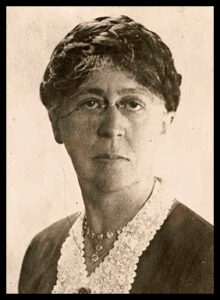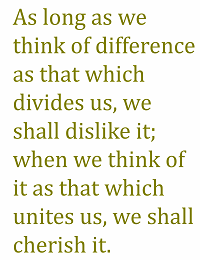 Mary Parker Follett (1868-1933) was a visionary in the field of human relations, democratic organization, and management. Born and raised in Massachusetts, in 1892 she entered what would become Radcliffe College, the women’s branch of Harvard. She graduated from Radcliffe summa cum laude in 1898. Follett’s intensive research into government while at Radcliffe was published in her first book, The Speaker of the House of Representatives (1896), which was lauded by Theodore Roosevelt as the best study of that office of government ever done.
Mary Parker Follett (1868-1933) was a visionary in the field of human relations, democratic organization, and management. Born and raised in Massachusetts, in 1892 she entered what would become Radcliffe College, the women’s branch of Harvard. She graduated from Radcliffe summa cum laude in 1898. Follett’s intensive research into government while at Radcliffe was published in her first book, The Speaker of the House of Representatives (1896), which was lauded by Theodore Roosevelt as the best study of that office of government ever done.
From 1900 to 1908, Follett devoted herself to social work in the Roxbury neighborhood of Boston. In 1908 she became chairperson of the Women’s Municipal League’s Committee on Extended Use of School Buildings, and in 1911 she helped open the East Boston High School Social Center. She was instrumental in the formation of many other social centers throughout Boston. Her experience in this area helped to transform her view of democracy. Follett later served as a member of the Massachusetts Minimum Wage Board, and in 1917 she became vice president of the National Community Center Association. By this time, however, she had turned most of her attention to writing for a wider public regarding what the social centers had taught her about democracy. In 1918 she published her second book, The New State, which is concerned with the human nature of government, democracy, and the importance of local community as the formative space for learning democracy as a way of life.
In 1924, Follett published her third book, Creative Experience. Drawing upon psychology and Follett’s real-world observations and experience, this work addresses more directly the creative interaction of people through an on-going process of circular response. From this point until her death in 1933, Follett found her most enthusiastic audience in the world of business. Admiration and respect for her work grew on both sides of the Atlantic, and she became a leading management consultant. (Peter Drucker, who discovered Follett’s work in the 1950s, is said to have referred to Follett as his “guru.”)
death in 1933, Follett found her most enthusiastic audience in the world of business. Admiration and respect for her work grew on both sides of the Atlantic, and she became a leading management consultant. (Peter Drucker, who discovered Follett’s work in the 1950s, is said to have referred to Follett as his “guru.”)
Follett’s various papers and speeches on the subject of management were published in 1942 by Henry Metcalf and Lionel Urwick in a book called Dynamic Administration. Another celebration of her work in this context is Mary Parker Follett: Prophet of Management, which was edited by Pauline Graham and published in 1995. In 1998, The New State was re-issued by Penn State Press, with a preface by Benjamin Barber. A comprehensive biography of Follett, written by Joan Tonn, was published in 2003.
Follett is increasingly recognized today as the originator (at least in modern times) of ideas that are today commonly accepted as cutting edge in organizational theory and public administration. These include the idea of seeking “win-win” solutions, community-based governance, strength in human diversity, situational leadership, and a focus on process. Too few, however, are familiar with Follett and her insights, and at a moment in our society when they are needed more than ever.
Follett Quotes
The following link is to a folder with images of Follett quotes addressing a variety of topics.
Follett Quotes
Honors Named After Follett
American Political Science Association: Mary Parker Follett Award for Best Article
“The Mary Parker Follett Prize recognizes the best article on politics and history published in the previous year.”
https://apsanet.org/membership/organized-sections/section24/
Association for Conflict Resolution: Mary Parker Follett Award
“The Mary Parker Follett Award is presented to an individual who has shown a passion and willingness to take risks in tackling a contemporary problem or opportunity in the field of dispute resolution; has used innovative and experimental techniques; and draws upon the talents and ideas of all persons involved.”
https://acrnet.org/page/MaryParker
Accounting, Auditing, & Accountability Journal: Mary Parker Follett Award
“Named in memory of a pioneering woman in the field of management and accountability literature who was international and interdisciplinary in her approach.”
https://www.emeraldgrouppublishing.com/journal/aaaj/mary-parker-follett-award-2023
Academy of Organization Science: The Kurt Lewin & Mary Parker Follett Organization and Administration Sciences Fellowship
“The Kurt Lewin and Mary Parker Follett Fellowship is designed to provide a platform for research, publication, and presentation of scholar-practitioners who exhibit the work and values of the two organization and administration science pioneers for whom the fellowship was named.”
